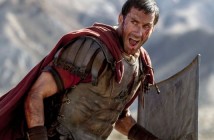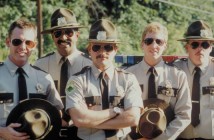
Editor’s Note: The Big Short expands to wide release on December 23.
Adam McKay has spent quite a while crafting a certain kind of cinematic expectation. The guy makes dumb movies. Well, let me correct slightly, he makes movies that focus on dumb people. His partnership with Will Ferrell has led to the type of films that get celebrated in dorm rooms around two in the morning. McKay knows his audience and more importantly he knows how to entertain them. Despite his cinematic output, I never questioned whether or not the guy was actually intelligent. You don’t log three seasons as head writer of Saturday Night Live, launch a successful comedy video website, or manage to wring a sequel out of a film that was largely a failure at the box office without a bit of smarts. But I don’t think it was until The Big Short that we really had to consider how much he has been underestimated.
Should we have seen this coming? Just maybe. In 2010’s The Other Guys, McKay started to hint at his dissatisfaction/disgust with the financial world. McKay nestled the undercurrent of an actual message within this vehicle for sophomoric comedy. Amongst all of the yelling, silly dialogue, and general mayhem were hints at an indictment of our current financial system. As that film’s credits rolled, McKay stopped holding back, and through a series of infographics told us all just how messed up all this financial stuff actually is. It was a strange coda on the film that I must assume was largely ignored, but in an odd way it acted as a prologue to The Big Short. In the very least, it showed us that this is something that McKay cares about. In fact, he might have cared more about getting this story right than even the audience.
…these little bits of expanded explanation are some of the most entertaining and, honestly, well-executed within the film.
Probably the biggest hurdle to get over for a film like The Big Short, that relies so heavily on complex financial logic, dripping with jargon, and riddled with avenues for a special and thorough kind of confusion, is to make it accessible. The audience needs to care about these people and the actions they are taking, and to a small extent they have to understand just what is going on in order to hop on that bus of empathy. So McKay deploys a legion of celebrities, metaphors, and occasional outright explanation to try to teach us. And that is largely what he is doing in these many segments. His writing swoops in like the most attractive of college professors and lays out exactly what his characters are talking about. While they are not always effective at making the image a crystal clear one, he does a whole lot to remove a bulk of the fogginess. More impressively, these little bits of expanded explanation are some of the most entertaining and, honestly, well-executed within the film. They are teaching tools and you shouldn’t be surprised when some savvy educator starts plundering The Big Short for clips in their next lesson.
 These little offshoots serve as a representation of the film as a whole. McKay takes his gift for comedy and weaves it into drama like a rich tapestry. Where his other films push the comedy to absurd levels, here he keeps it reined in just enough to be believable. His writing is organic and genuine, these don’t seem like grandiose set pieces but rather like conversations that actually happened with real people, not just caricatures. It certainly isn’t hurting things that the words are being spoken by an impressively talented group of actors. The field is a crowded one, with a cast list that almost sounds like a joke when read successively. Steve Carell and Christian Bale are getting a good deal of the love, the former for his ability to play more dramatic and the latter for doing exactly what we’ve come to expect from him. But do not ignore the other performances. Ryan Gosling may be the most comedic of the bunch and he does it like a seasoned professional.
These little offshoots serve as a representation of the film as a whole. McKay takes his gift for comedy and weaves it into drama like a rich tapestry. Where his other films push the comedy to absurd levels, here he keeps it reined in just enough to be believable. His writing is organic and genuine, these don’t seem like grandiose set pieces but rather like conversations that actually happened with real people, not just caricatures. It certainly isn’t hurting things that the words are being spoken by an impressively talented group of actors. The field is a crowded one, with a cast list that almost sounds like a joke when read successively. Steve Carell and Christian Bale are getting a good deal of the love, the former for his ability to play more dramatic and the latter for doing exactly what we’ve come to expect from him. But do not ignore the other performances. Ryan Gosling may be the most comedic of the bunch and he does it like a seasoned professional.
As successful as the bulk of the film is, McKay begins to show his amateur status as a dramatic director on more than one occasion. The intercut quotes that occasionally pop up scream of a director trying just a bit too hard, as do some of the fourth wall breaking. These asides do nothing to make the film better and act more as distractions and roadblocks, robbing the film of its bustling momentum at times when the audience just wants to keep riding. They aren’t deal breakers but they take a film that was on a fantastic path and knock it down to a lower rung. In his other films, McKay has made us cringe at awkward situations and slapstick violence, this time we’re just cringing at his poor decisions.
Ryan Gosling may be the most comedic of the bunch and he does it like a seasoned professional.
Luckily, these momentary lapses are exactly that, momentary. It’s as if McKay had some odd delusions of grandeur that forced him to forget his innate strengths as a filmmaker. For the most part, McKay shows that he’s not just Will Ferrell’s lackey, but a smart writer that can play in the fields with big boys. In fact, he so deftly leverages his own sensibilities in this world of drama and reality that it leaves you wondering just why he hasn’t done this before. The Big Short is a fast-moving, well-written, captivating drama that manages to make you laugh at what are some pretty awful situations. McKay doesn’t try to hide his distaste for this world of finance, the vitriol aimed at Wall Street positively pours out of the screen. He translates this hate into an attempt at understanding, pushing the story at the audience in a way that is both educating and entertaining. In some ways The Big Short is constructed like some oddity of narrative and documentary. It calls its audience to do something, for if we don’t we are assuredly on this same cyclical path of destruction. The Big Short may not have the answers to our problems, but it is one of the most entertaining and smartly written accounts of how wrong it all went.
The Big Short is a fast-moving, well-written, captivating drama that manages to make you laugh at what are some pretty awful situations.



